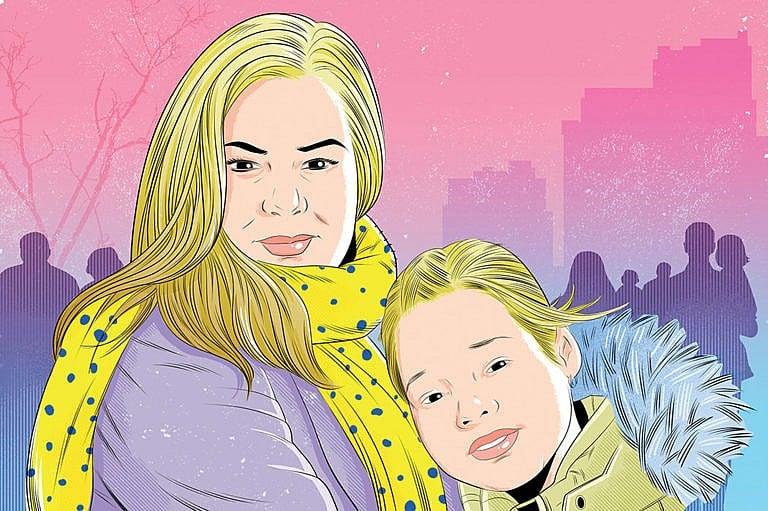“I fled the war in Ukraine. Now I help other newcomers settle in Canada.”
My daughter and I were lucky to find a host family in Ottawa. I want to pay it forward.

(Illustration by Dominic Bugatto)
Share

In March of 2022, I had just moved into a new home with my nine-year-old daughter, Miia, in Kramatorsk, an industrial city in eastern Ukraine. Miia and I led happy lives there: she took swimming lessons, learned martial arts and acted in a kids’ TV show, while I worked with the German Red Cross and volunteered as an English translator for a non-profit. I had also just bought a cottage and a place for my mother.
During the first night in our new place, at 5 a.m., the bombing started. I quickly fled west with my daughter, mother, sister and niece to Lviv. We were in a train cabin meant for four people, but 15 people had crammed inside as we all evacuated the city.
SIGN UP TO READ THE BEST OF MACLEAN’S:
Get our top stories sent directly to your inbox twice a week
From Lviv, we went to Poland, but I wanted to get as far away from Russia as possible. I decided we would move to Canada, where I got a three-year work permit through the Canada-Ukraine authorization for emergency travel.
In the fall of that year, Miia and I flew from Warsaw to Zurich, then to Montreal, where we met Maria and Ragui, a middle-aged couple who had agreed to host us. They drove us straight to Ottawa, where Miia and I shared a bedroom at their home for eight months as we got settled. I think of them now as my Canadian parents: they let us stay for free, helped us get our social insurance numbers and health cards, registered Miia for school and edited my CV to match Canadian standards.
I thought there would be many opportunities to work at non-profits in Ottawa, but finding a job was difficult. Regardless of my education and background, employers told me that I needed one year of Canadian work experience before anyone would hire me. Finally, after a month of searching, I found work as a settlement officer for the Jewish Family Services of Ottawa, a community agency.
Now, I get to help other Ukrainian newcomers settle into life in the country. I assist them with tasks, like getting their own SINs and bank accounts. One time, a woman came with her adult son who had a speaking disability, and we were able to find them a home and get him a job at a car dealership. Another time, I helped a family of 10 register for schools, find second-hand furniture and connect with Ukrainian communities in Ottawa through Facebook and Telegram; over the holidays, we made sure the kids had Christmas presents. Often, Ukrainians come to my office to chat with me because they’re lonely. I was lucky to have Maria and Ragui to help me settle in. Now I can be that support person for others.
Miia and I eventually moved to a two-bedroom apartment close to downtown Ottawa, and we spend our free time at our building’s swimming pool and walking along the Rideau Canal. Miia is settling well here. By her second week of school, kids were inviting her to birthday parties. Still, she’s remained close with her Ukrainian friends and her cousin in Poland: they chat online, play Roblox and draw anime together virtually. I also make sure to speak Ukrainian with Miia at home, because I’ve noticed that she’s starting to forget some words.
READ: I moved from India to Alberta to live the multigen lifestyle
The last piece of the puzzle is figuring out how we can stay in Canada permanently. More than 185,000 Ukrainians have arrived since the war started, and research shows that 90 per cent of us want to stay here. While Canada made a special pathway for permanent residence for Ukrainians, only those with Canadian citizen or permanent resident family members are eligible for it. Otherwise, becoming a permanent resident in Canada is challenging. There are only 500,000 permanent spots each year and, like the other 2.2 million temporary residents in the country, we have to go through the points system—where factors such as age, Canadian education credentials, type of job and English proficiency test scores determine an applicant’s points—to obtain permanent residency. My work permit will expire next year, so I have to apply for permanent residency soon. I hope I have enough points to make it.